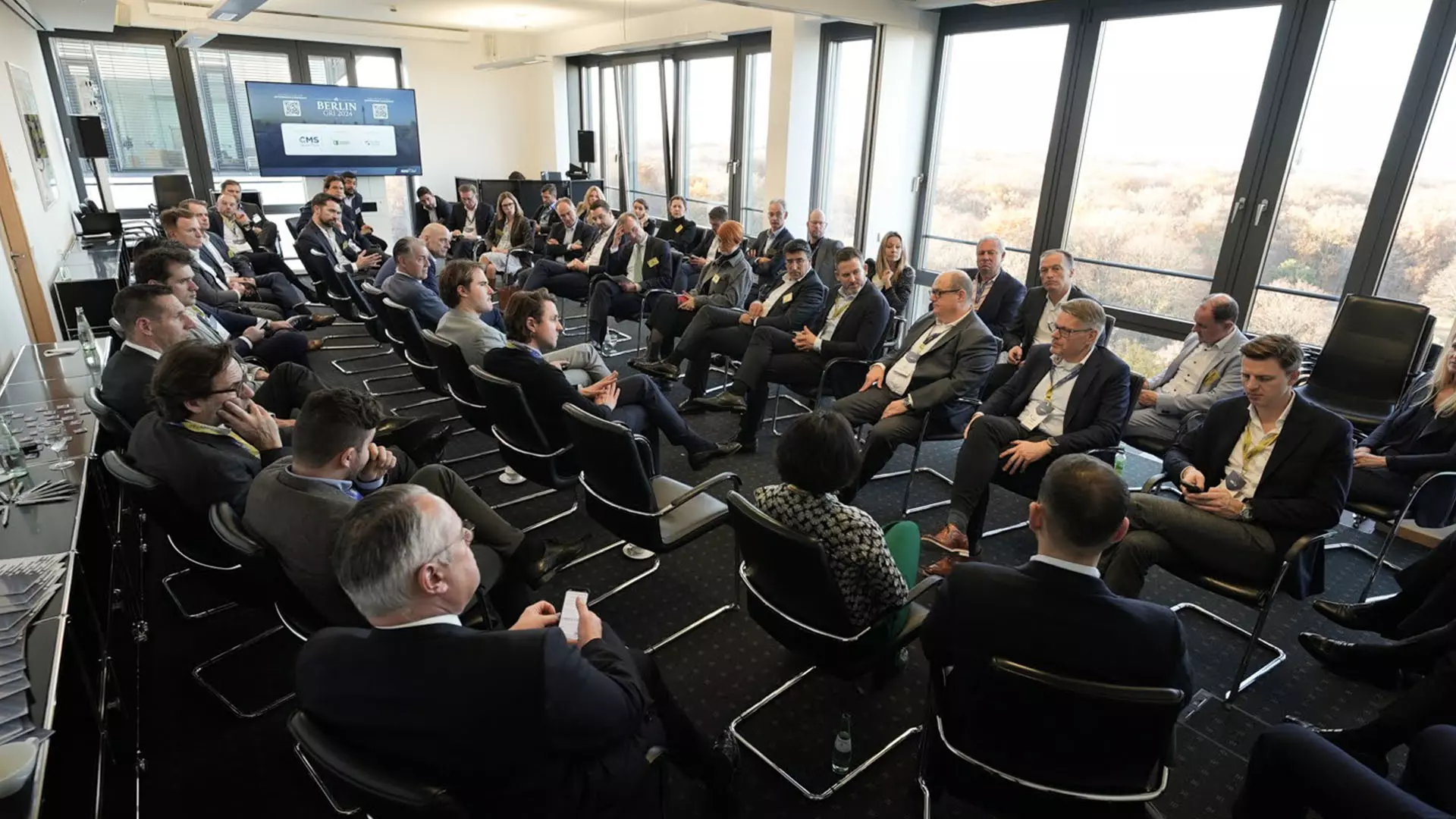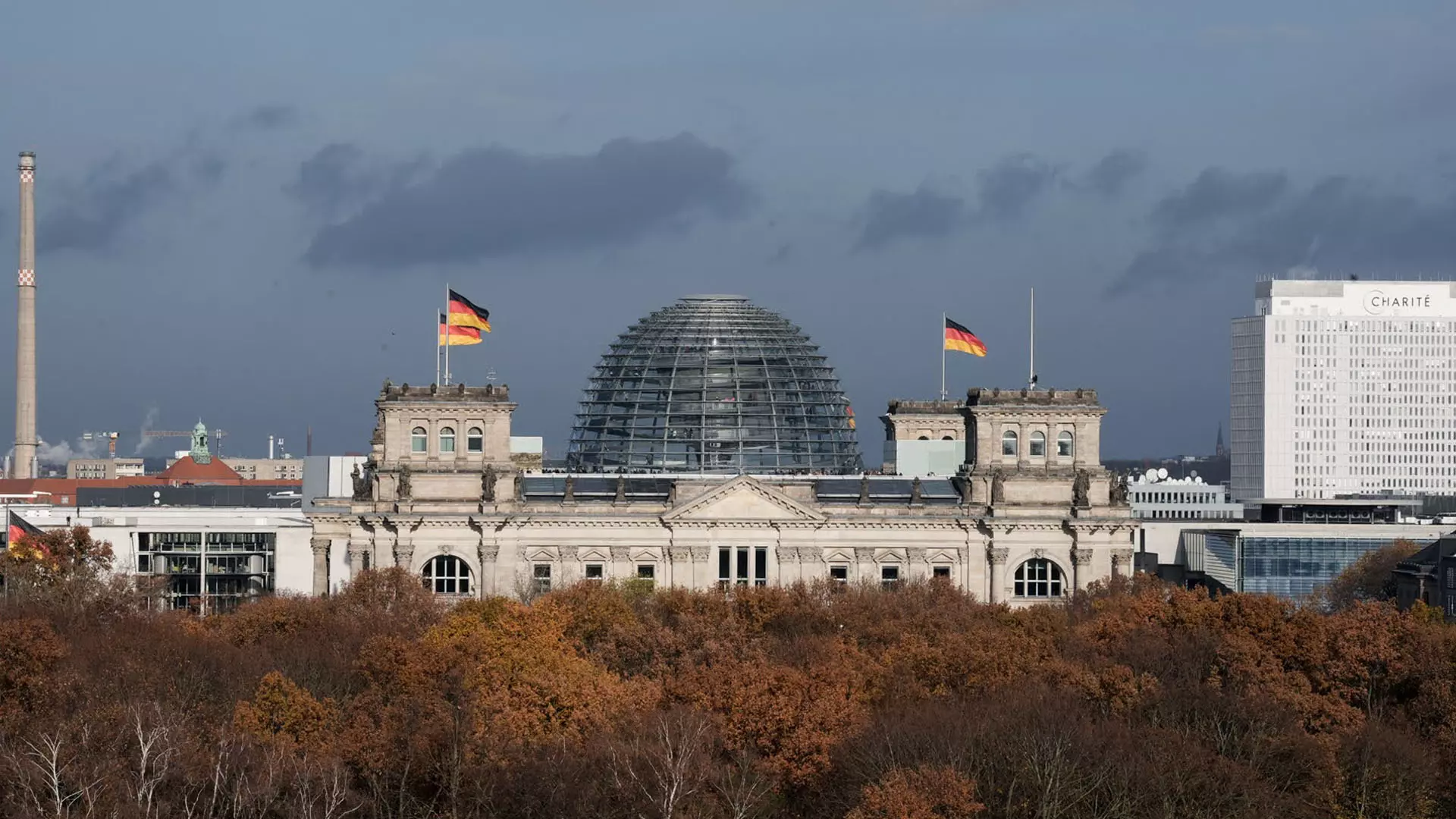 Credit: GRI Club
Credit: GRI ClubIs Germany still the powerhouse of real estate investment?
Berlin GRI 2024: Key takeaways and senior insights from high-level investor-led roundtable discussions at annual conference
December 6, 2024Real Estate
Written by Helen Richards
The second edition of Berlin GRI 2024, co-hosted by Club Partners CMS, welcomed more than sixty of the region’s leading real estate market decision-makers to partake in high-level analysis of the current German real estate market scenario.
The day commenced with a dynamic talkshow assessing if Germany is still considered a powerhouse within Europe, following its weakening safe haven status. The panel concurred that the economic strength, long-term potential, and solid fundamentals in sectors like residential and logistics continue to support the country as a prime destination for cross-border real estate investment.
However, market illiquidity, regulatory complexity, and a relative lack of transparency pose hurdles for international investors, particularly newcomers, and the panel suggested that successful investment often hinges on finding reliable local partners to navigate these barriers.
It was also agreed that high-quality assets, especially in prime office and residential markets, are showing signs of recovery, while secondary stock faces prolonged challenges due to ESG compliance and lower demand.
Strategic reforms, particularly in deregulation and fostering sustainability, were considered important in order to enhance the country’s global competitiveness and provide a stable foundation for future investment.
Read all key takeaways from the series of high-level discussions at Berlin GRI 2024 below.

International investors, while cautious, continue to see promise in Berlin, particularly for landmark developments, but capital deployment is hindered by regulatory hurdles and low liquidity. Stakeholders emphasise the need for tax reforms, faster permitting processes, and strategic government interventions to restore confidence and foster growth.
As Berlin competes with other European cities, innovative approaches and structural reforms are critical to revitalising its market and attracting long-term investment.
ESG compliance and sustainability are central to both financing decisions and project viability, with green loans and decarbonisation initiatives gaining traction. Meanwhile, alternative financing options, such as bridge loans and preferred equity, are filling gaps for higher-risk or delayed projects, though at significantly higher costs.
However, high construction costs, lengthy approval processes, and regulatory barriers, including rent controls and extensive building requirements, are delaying new construction and exacerbating the housing shortage. Innovative solutions such as series construction and prefabricated modules are being adopted in response to these construction challenges, though these remain cost-prohibitive in many cases.
Meanwhile, renovating existing properties was noted to offer ESG advantages and align with sustainability goals, but tenant protections and economic viability is limiting widespread adoption.
Leaders in the sector emphasised the need for policy reforms to simplify building approvals, balance regulation with investment incentives, and foster public-private partnerships to meet housing demands.

High street retail and shopping centers, however, face rent pressures and declining investor confidence, prompting a shift toward mixed-use developments that combine retail, residential, and office spaces. These projects are particularly successful in urban areas, while smaller cities and suburban regions benefit from localised, neighborhood-focused retail.
Sustainability is a growing priority, with energy-efficient building technologies and renewable energy integration becoming standard in new developments, although retrofitting older properties remains challenging.
As consumer expectations evolve, technological integration such as click-and-collect and self-checkout is gaining traction, further bridging the gap between online and offline retail.
Mixed-use developments are emerging as a sustainable solution, blending residential, commercial, and social infrastructure to meet diverse urban needs while fostering community engagement.
Berlin and Munich illustrate contrasting dynamics: Berlin's affordability and cultural evolution attract startups and smaller enterprises, whereas Munich benefits from stable governance and big-tech interest despite higher living costs.
Sustainability is now central, as ESG certifications like DGNB Platinum become standard for new projects, while retrofitting older properties depends heavily on tenant collaboration.
The growing demand for last-mile logistics, driven by the ongoing expansion of e-commerce, highlights the importance of urban logistics projects, though these face higher complexity and costs. These challenges particularly affect Berlin, where strong inner-city demand but limited industrial presence and geographical isolation is affecting large-scale developments.
Although financing has become more selective, favouring well-structured projects with strong tenant commitments, the sector’s long-term outlook remains positive, buoyed by e-commerce growth and the shift toward strategic, sustainable investments.

Serviced apartments offer a scalable and efficient alternative to traditional hotels and Airbnb, appealing to business travelers, expats, and corporate clients needing medium-term stays in urban areas like Berlin.
Operators have embraced technology, with algorithm-driven pricing and minimal staffing, aligning with the preferences of younger, tech-savvy travelers. The sector also benefits from the conversion of vacant office spaces into serviced apartments, particularly in cities with high office vacancies, offering a cost-effective way to meet central location demands.
While competing with hotels, serviced apartments differentiate themselves with larger spaces, kitchenettes, and consistent quality. Investors are increasingly attracted to their lower operational costs, though challenges remain, including navigating regulatory hurdles and securing innovative financing models.
Berlin, with its polycentric structure and high housing demand, stands out as a key market, but operators are also expanding into other European hubs like Amsterdam and Paris. This sector's adaptability and alignment with evolving travel and work trends suggest a promising future, coexisting alongside traditional hotels to address diverse accommodation needs.
The conversation among leading German real estate market players will continue at the annual regional conference, Deutsche GRI 2024, on 14th May 2025 in Frankfurt.
The second edition of Berlin GRI 2024, co-hosted by Club Partners CMS, welcomed more than sixty of the region’s leading real estate market decision-makers to partake in high-level analysis of the current German real estate market scenario.
The day commenced with a dynamic talkshow assessing if Germany is still considered a powerhouse within Europe, following its weakening safe haven status. The panel concurred that the economic strength, long-term potential, and solid fundamentals in sectors like residential and logistics continue to support the country as a prime destination for cross-border real estate investment.
However, market illiquidity, regulatory complexity, and a relative lack of transparency pose hurdles for international investors, particularly newcomers, and the panel suggested that successful investment often hinges on finding reliable local partners to navigate these barriers.
It was also agreed that high-quality assets, especially in prime office and residential markets, are showing signs of recovery, while secondary stock faces prolonged challenges due to ESG compliance and lower demand.
Strategic reforms, particularly in deregulation and fostering sustainability, were considered important in order to enhance the country’s global competitiveness and provide a stable foundation for future investment.
Read all key takeaways from the series of high-level discussions at Berlin GRI 2024 below.

Berlin GRI 2024 gathered 60+ leading real estate market players for a day of high-level roundtable discussions, addressing the investment cycle, financing, and sector-specific trends. (Credit: GRI Club)
Investment Cycle
Berlin’s real estate market investment cycle is marked by significant price corrections, slow recovery, and persistent structural barriers. While the city’s fragmented market and historically low yields have intensified the impact of rising interest rates, Berlin’s potential remains tied to unlocking new development opportunities and addressing zoning inefficiencies.International investors, while cautious, continue to see promise in Berlin, particularly for landmark developments, but capital deployment is hindered by regulatory hurdles and low liquidity. Stakeholders emphasise the need for tax reforms, faster permitting processes, and strategic government interventions to restore confidence and foster growth.
As Berlin competes with other European cities, innovative approaches and structural reforms are critical to revitalising its market and attracting long-term investment.
Financing & Loans
The German real estate financing market is adapting to a more cautious landscape marked by stricter lending standards, increased margins, and a shift away from speculative projects. Banks remain committed to financing but prioritise structured, lower-risk developments with clear pre-letting or pre-sale agreements.ESG compliance and sustainability are central to both financing decisions and project viability, with green loans and decarbonisation initiatives gaining traction. Meanwhile, alternative financing options, such as bridge loans and preferred equity, are filling gaps for higher-risk or delayed projects, though at significantly higher costs.
Build-to-Rent (BTR)
The BTR market in Germany presents opportunities amid rising demand for rental housing driven by population growth, household downsizing, and economic shifts. As interest rates rise, renting has become more cost-effective than buying in most locations, intensifying demand for professionally managed rental properties. This was noted to be particularly true in metropolitan areas and their well-connected peripheries.However, high construction costs, lengthy approval processes, and regulatory barriers, including rent controls and extensive building requirements, are delaying new construction and exacerbating the housing shortage. Innovative solutions such as series construction and prefabricated modules are being adopted in response to these construction challenges, though these remain cost-prohibitive in many cases.
Meanwhile, renovating existing properties was noted to offer ESG advantages and align with sustainability goals, but tenant protections and economic viability is limiting widespread adoption.
Leaders in the sector emphasised the need for policy reforms to simplify building approvals, balance regulation with investment incentives, and foster public-private partnerships to meet housing demands.

Berlin’s real estate market investment cycle is marked by significant price corrections, slow recovery, and persistent structural barriers. (Credit: GRI Club)
Retail
Consumer behaviours, economic challenges, and sustainability demands are driving transformation in the German retail sector. Grocery retail, a resilient segment less affected by online shopping, continues to attract investor interest with long-term rental contracts and reliable returns.High street retail and shopping centers, however, face rent pressures and declining investor confidence, prompting a shift toward mixed-use developments that combine retail, residential, and office spaces. These projects are particularly successful in urban areas, while smaller cities and suburban regions benefit from localised, neighborhood-focused retail.
Sustainability is a growing priority, with energy-efficient building technologies and renewable energy integration becoming standard in new developments, although retrofitting older properties remains challenging.
As consumer expectations evolve, technological integration such as click-and-collect and self-checkout is gaining traction, further bridging the gap between online and offline retail.
Offices & Mixed Use
In Germany’s office and mixed-use real estate market, rising vacancy rates and increasing prime rents highlight a growing divergence in demand for high-quality spaces, while the trend of underutilised properties underscores the need for innovative approaches.Mixed-use developments are emerging as a sustainable solution, blending residential, commercial, and social infrastructure to meet diverse urban needs while fostering community engagement.
Berlin and Munich illustrate contrasting dynamics: Berlin's affordability and cultural evolution attract startups and smaller enterprises, whereas Munich benefits from stable governance and big-tech interest despite higher living costs.
Logistics
The logistics sector remains an attractive investment opportunity despite challenges such as land and construction costs, and stricter ESG compliance requirements. These obstacles are reshaping development strategies, with a focus on standard rectangular warehouses designed to be green and flexible.Sustainability is now central, as ESG certifications like DGNB Platinum become standard for new projects, while retrofitting older properties depends heavily on tenant collaboration.
The growing demand for last-mile logistics, driven by the ongoing expansion of e-commerce, highlights the importance of urban logistics projects, though these face higher complexity and costs. These challenges particularly affect Berlin, where strong inner-city demand but limited industrial presence and geographical isolation is affecting large-scale developments.
Although financing has become more selective, favouring well-structured projects with strong tenant commitments, the sector’s long-term outlook remains positive, buoyed by e-commerce growth and the shift toward strategic, sustainable investments.

GRI Club (Credit: The conversation among leading German real estate market players will continue at the annual regional conference, Deutsche GRI 2024, on 14th May 2025 in Frankfurt.)
Serviced Apartments & Hotels
Demand for flexible, tech-enabled accommodations that cater to modern travel trends is driving rapid growth in Germany’s serviced apartment sector. This surge has been fueled by the pandemic, which emphasised the importance of digitalisation and low-contact solutions.Serviced apartments offer a scalable and efficient alternative to traditional hotels and Airbnb, appealing to business travelers, expats, and corporate clients needing medium-term stays in urban areas like Berlin.
Operators have embraced technology, with algorithm-driven pricing and minimal staffing, aligning with the preferences of younger, tech-savvy travelers. The sector also benefits from the conversion of vacant office spaces into serviced apartments, particularly in cities with high office vacancies, offering a cost-effective way to meet central location demands.
While competing with hotels, serviced apartments differentiate themselves with larger spaces, kitchenettes, and consistent quality. Investors are increasingly attracted to their lower operational costs, though challenges remain, including navigating regulatory hurdles and securing innovative financing models.
Berlin, with its polycentric structure and high housing demand, stands out as a key market, but operators are also expanding into other European hubs like Amsterdam and Paris. This sector's adaptability and alignment with evolving travel and work trends suggest a promising future, coexisting alongside traditional hotels to address diverse accommodation needs.
The conversation among leading German real estate market players will continue at the annual regional conference, Deutsche GRI 2024, on 14th May 2025 in Frankfurt.